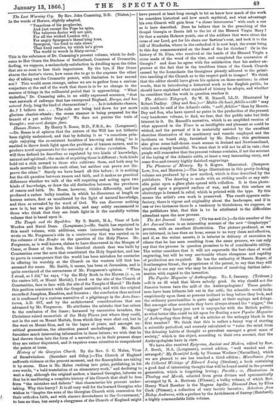own words, "a bald translation of an elementary work," and
declining to wait a day, although the original author, a learned Georgian, informs us that he is meditating a complete history of his Church that shall be free from "the mistakes and defects" that characterize his present under- taking. Why this hurry? It is all very well for the learned Georgian who wishes to "inspire the sons of the Georgian Church with veneration for their orthodox faith, and with sincere devotedness to the Government," to lose no time, but surely a clergyman of the Church of England might have paused at least long enough to let us know how much of the work he considers historical and how much mythical, and what advantage his own Church will gain from " a closer intercourse " with such a one as is here described. Does he believe that in the preaching of the Gospel Georgia or Iberia fell to the lot of the Blessed Virgin Mary ? Or that a certain Hebrew youth, one of the soldiers that were about the cross of our Lord, got for his share our Saviour's coat, and took it to the hill of Mtzeketha, where in the cathedral it is now kept, the event being to this day commemorated on the feast of the 1st October ? Or in the history of St. Nina, who received at the hands of the Blessed Virgin a cross made of the wood of the vine, and completed the conversion of Georgia ? and does he agree with the satisfaction that his author ex- presses at the fact that in the troublous times of the Greek Church caused by the Iconoclasts the Georgians piously adhered to the primi- tive teaching of the Church as to the respect paid to images? We think that the editor should have given his opinion on these matters ; in other words, that in introducing a historical work to the English public, he should have explained what standard of history he adopts, and whether he considers that the work in question reaches it.






























 Previous page
Previous page